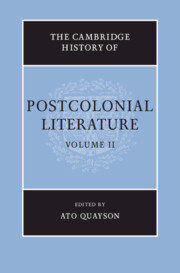Book contents
- Frontmatter
- 21 The language question in India and Africa
- 22 English and the development of postcolonial literature
- 23 Religion and postcolonial writing
- 24 Postcolonial responses to the Western canon
- 25 Island writing, Creole cultures
- 26 Magical realism
- 27 Palimpsest and hybridity in postcolonial writing
- 28 The narrative forms of postcolonial fiction
- 29 Poetry and postcolonialism
- 30 Primitivism and postcolonial literature
- 31 Popular culture and postcolonial literary production in Africa and India
- 32 Film and postcolonial writing
- 33 Fanon, Memmi, Glissant and postcolonial writing
- 34 Negritude and postcolonial literature
- 35 Publishing, prizes and postcolonial literary production
- 36 Key journals and organizations
- Bibliography
- Index
- References
21 - The language question in India and Africa
Published online by Cambridge University Press: 28 January 2012
- Frontmatter
- 21 The language question in India and Africa
- 22 English and the development of postcolonial literature
- 23 Religion and postcolonial writing
- 24 Postcolonial responses to the Western canon
- 25 Island writing, Creole cultures
- 26 Magical realism
- 27 Palimpsest and hybridity in postcolonial writing
- 28 The narrative forms of postcolonial fiction
- 29 Poetry and postcolonialism
- 30 Primitivism and postcolonial literature
- 31 Popular culture and postcolonial literary production in Africa and India
- 32 Film and postcolonial writing
- 33 Fanon, Memmi, Glissant and postcolonial writing
- 34 Negritude and postcolonial literature
- 35 Publishing, prizes and postcolonial literary production
- 36 Key journals and organizations
- Bibliography
- Index
- References
Summary
In February 2008, India’s largest metropolis, Mumbai, witnessed a sordid spectacle of linguistic and regional chauvinism. The discredited Shiv Sainik, Raj Thackeray, attacked India’s top Bollywood star, Amitabh Bachchan, for showing more allegiance to his Hindi roots in Uttar Pradesh (UP) than to his Marathi-speaking Mumbai home, the capital of the state of Maharashtra and the city that gave Bachchan his stardom. The cause of this outburst was Bachchan’s decision to fund a college for rural women in his Hindi-speaking home state, UP. Thackeray and his rabid band of ‘Marathi’ loyalists saw this as an act of betrayal. Their logic was simple and deadly. Bachchan’s first loyalty should lie with Maharashtra and its largely Marathi-speaking ilk. They should be the recipients of his largesse. While Amitabh Bachchan refused to respond to the provocation, his wife Jaya protested against this intimidation and even taunted Thackeray at a film premiere by deliberately making a case for why she would speak in ‘Hindi’. Thackeray went on the offensive, demanding an apology from Jaya Bachchan, and even threatening to block all film releases that featured Bachchan, his wife and their son. Despite the avowed cosmopolitanism of Mumbai – the famed city of culturally diverse migrants – linguistic chauvinism, it appears, is rife. For long-term residents of Mumbai this episode will perforce trigger memories of other instances of linguistic intimidation that has dogged the metropolis since the very beginning of the formation of linguistically determined states in post-independence India. Previous victims have been Gujarati- and Tamil-speaking dwellers of Mumbai.
- Type
- Chapter
- Information
- The Cambridge History of Postcolonial Literature , pp. 649 - 702Publisher: Cambridge University PressPrint publication year: 2012

